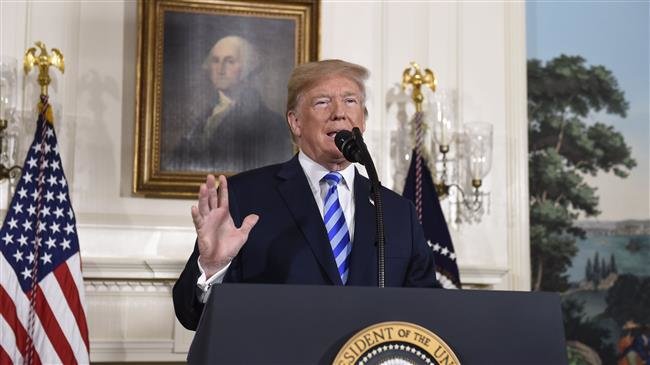Trump withdraws U.S. from nuclear deal

TEHRAN - In a declaration on Tuesday, Donald Trump officially withdrew the United States from the 2015 nuclear agreement, officially called the Joint Comprehensive Plan of Action or JCPOA.
"I am announcing today that the United States will withdraw from the Iran nuclear deal," Trump said from the White House. Trump also said he will reinstate economic sanctions on Iran.
As usual, the notoriously unpredictable Trump used the harshest language against Iran to justify his illegal move which goes against the face of the entire world. He said the deal "should have never been made”.
Trump announced the pullout from the international agreement despite warnings by the entire world including Washington’s European allies.
The decision came despite the fact that some Republicans in the national security establishment had said that the consequences of leaving could be worse than staying in.
The world’s five other major powers (Russia, China, Britain, France, and Germany), who were equal parties to the accord, had strongly warned against withdrawal.
Trump’s move was a breach of international law as the multilateral agreement had been endorsed by the UN Security Council in the form a resolution.
Rouhani sets conditions for remaining in the nuclear agreement
Immediately after Trump announced his decision, President Hassan Rouhani said Iran can continue to go ahead with the nuclear program if Tehran’s interests with the other countries signatory to the nuclear deal are “guaranteed”.
However, Rouhani added, if “national interests” are not met Iran will resume its industrial nuclear enrichment work with a normal speed.
He said he has ordered the Atomic Energy Organization of Iran (AEOI) to make necessary preparations for speeding up nuclear activities, which had been scaled back under the agreement, if the JCPOA just remains just on the “paper”.
Immediately after Trump’s announcement, EU foreign policy chief Federica Mogherini announced that her 28-nation bloc will remain committed to the agreement.
The German Foreign Ministry also insisted on preserving the nuclear agreement by the EU.
Toughest inspection regime
Under the JCPOA, Iran is obliged to limit its nuclear activities in exchange for termination of economic and financial sanctions.
Since the deal took effect in January 2016, the UN’s nuclear watchdog, the International Atomic Energy Agency, has issued 11 reports each time confirming Iran’s full compliance to the agreement.
The UN’s nuclear watchdog has acknowledged that Iran was the subject to the toughest inspections ever imposed on any country.
Despite his criticism of the deal, neither Trump nor his aides had been able to say that Iran was infringing the agreement. Even some former Israeli intelligence and military figures had warned against the U.S. pullout.
Iran’s options
Foreign Minister Mohammad Javad Zarif had recently said, “If they want to kill the deal, they have that option, but they have to face the consequences.”
Zarif added, “It’s dangerous to be arrogant, very dangerous.”
For fifteen months, Zarif said, Trump has already tried to sabotage the accord by disrupting normal business with Iran.
EU plans to protect companies
Hours before Trump declared his decision the European Union said it has plans to protect the European companies if Trump pulls out of the accord.
“We are working on plans to protect the interests of European companies,” Bloomberg quoted Maja Kocijancic, EU spokeswoman for foreign affairs, as telling reporters in Brussels on Tuesday.
She also said, “The agreement is very important for global security.”
“The JCPOA is not based on assumptions of good faith or trust,” Kocijancic said. “It’s based on facts, on concrete commitments, on verification mechanisms, on very strict monitoring.”
At a meeting of political directors at Brussels on Tuesday, the European Union trio of Germany, France and Britain announced that they would remain committed to the nuclear agreement. Iran’s Deputy Foreign Minister Abbas Araqchi was at the meeting which was chaired by Helga Schmidt, secretary general of the EU's foreign policy service.
PA/PA
Leave a Comment